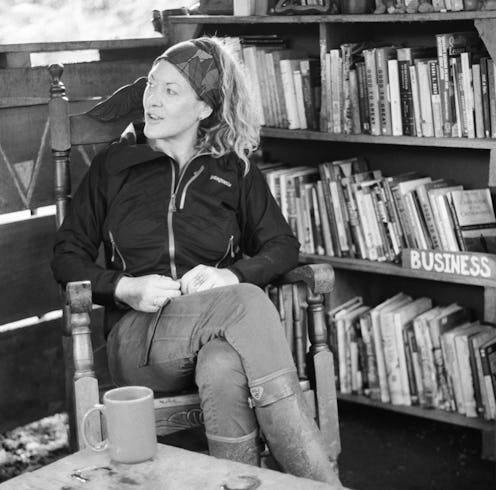Entertainment
Ondi Timoner Wants 'Jungletown' To Make You Turn Off The TV

When entrepreneur Jimmy Stice asked filmmaker Ondi Timoner to visit Kalu Yala, "the world's greatest sustainable modern town" that he's building in the middle of the Panamanian jungle, she didn't have plans to film a documentary. Timoner was simply curious to see Stice's work in action — but that quickly changed when she witnessed the project firsthand and met the participants. In an interview with Bustle, the two-time Sundance Grand Jury Prize winner says that, upon arrival, she instinctively broke out her camera. One thing quickly lead to another and, after 1,500 hours of footage and months spent in the jungle, the docuseries Jungletown will premiere on Viceland on March 28. Timoner's hope is that "the show will impact people's lives when we turn off the TV."
"When I walked into Kalu Yala I was blown away by the people, the work that they’re doing, and the way that it looked. It felt like the new frontier. It was intriguing to me on many levels and that’s how it all began," Timoner recalls. "I immediately took a camera out and started shooting. Then I told Jimmy that I was interested in filming it for a long period of time. That's kind of my specialty and I felt like this town should be documented by someone, and I might be the right person to do it."
Timoner plans to make a feature-length documentary over the course of years, culminating in a depiction of what Kalu Yala will look like when the town is completed. But, during her visit, she saw a unique opportunity and seized it. "They're building a town from the ground up, and that's something that has never been documented before," Timoner says. She partnered with Viceland and headed back to the Panamanian jungle with a team of fellow filmmakers. Timoner says the human element fascinated her — young millennial students and interns had opted to take a decidedly non-traditional approach to life, and it's something we can all learn from.
"The incredible people who go down there are extremely intelligent and passionate," she says. "They're the ones who have always had the ideas and been the 'unique' person in the group from their hometown, and now they’ve found a bunch of people like them." Of course, it's an incredibly intense environment and plenty of interns depart during Jungletown's first season. "It's a very goal-oriented place, but at the same time they're figuring out who they are, what their limitations are, and the chasm of their own vision of who they are and what they deserve," Timoner says.
There's a "bigger picture" element to Jungletown as well. We don't have to head into the Panamanian jungle to make a difference and to use our freedom for a noble cause. "When I think about what [Jungletown] is really about, it's about the freedom of how you choose to live. That's not a privilege we all have, but more of us have it than those of us who actually practice it," Timoner says. "You can live differently and you can choose to join a different crowd. You can choose to move to Panama into a jungle. You can not pursue that career that you were taught was the goal all that time if there’s a small voice in your head that’s saying, 'I need to be thinking about contributing in a bigger way right now.'"
Timoner contributes by sharing these stories, and as evidenced by her Sundance prizes, she is wildly successful. Unfortunately, she's one of very few women in the industry who can say that, and although she says she doesn't focus on the gender gap while on the job, she's "blown away by the statistics" (women accounted for just seven percent of directors in 2016's 250 top-grossing films). She tells Bustle that the gender gap in the independent film world is far smaller. "In the Academy, only one woman director was nominated this year and it was in the documentary category," Timoner says. "At Sundance, it’s typically between one third and one half for women directors. But, unfortunately, that’s not how the bigger picture works."
In the documentary genre, the number of women directors is much higher than it is for narrative features — and Timoner believes gender can be an asset as a documentarian. "Females are intuitive, emotionally intelligent multi-taskers," she says. "Women have a lot of levels and in documentaries that’s an asset because we’re not intimidated as much as men. We can kind of get in there and share. It's my style to share a lot of myself. I’m an open book, and that allows other people to feel comfortable, and like I’m not some kind of mystery person or closed book who’s judging them."
Jungletown will provide us with an intimate look at the young people who are in the trenches working towards the greater good — and it just might inspire people of all ages to take the leap and pursue a new life path.